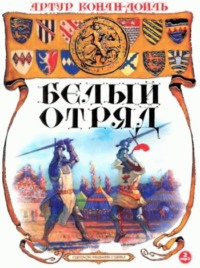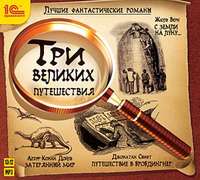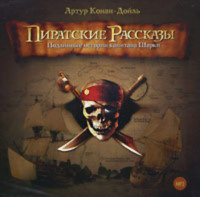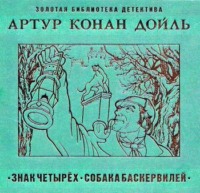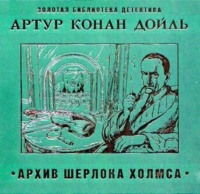 полная версия
полная версияRound the Fire Stories
“This isn’t natural, Jessie,” he cried. “Why are they all asleep? There’s Father Pierre – he’s off too. Jessie, Jessie, your mother is cold. Is it sleep? Is it death? Open the windows! Help! help! help!” He staggered to his feet and rushed to the windows, but midway his head spun round, his knees sank under him, and he pitched forward upon his face.
The young girl had also sprung to her feet. She looked round her with horror-stricken eyes at her prostrate father and the silent ring of figures.
“Professor Mercer! What is it? What is it?” she cried. “Oh, my God, they are dying! They are dead!”
The old man had raised himself by a supreme effort of his will, though the darkness was already gathering thickly round him.
“My dear young lady,” he said, stuttering and stumbling over the words, “we would have spared you this. It would have been painless to mind and body. It was cyanide. I had it in the caviare. But you would not have it.”
“Great Heaven!” She shrank away from him with dilated eyes. “Oh, you monster! You monster! You have poisoned them!”
“No, no! I saved them. You don’t know the Chinese. They are horrible. In another hour we should all have been in their hands. Take it now, child.” Even as he spoke, a burst of firing broke out under the very windows of the room. “Hark! There they are! Quick, dear, quick, you may cheat them yet!” But his words fell upon deaf ears, for the girl had sunk back senseless in her chair. The old man stood listening for an instant to the firing outside. But what was that? Merciful Father, what was that? Was he going mad? Was it the effect of the drug? Surely it was a European cheer? Yes, there were sharp orders in English. There was the shouting of sailors. He could no longer doubt it. By some miracle the relief had come after all. He threw his long arms upwards in his despair. “What have I done? Oh, good Lord, what have I done?” he cried.
It was Commodore Wyndham himself who was the first, after his desperate and successful night attack, to burst into that terrible supper-room. Round the table sat the white and silent company. Only in the young girl who moaned and faintly stirred was any sign of life to be seen. And yet there was one in the circle who had the energy for a last supreme duty. The Commodore, standing stupefied at the door, saw a grey head slowly lifted from the table, and the tall form of the Professor staggered for an instant to its feet.
“Take care of the caviare! For God’s sake, don’t touch the caviare!” he croaked.
Then he sank back once more and the circle of death was complete.
THE JAPANNED BOX
It was a curious thing, said the private tutor; one of those grotesque and whimsical incidents which occur to one as one goes through life. I lost the best situation which I am ever likely to have through it. But I am glad that I went to Thorpe Place, for I gained – well, as I tell you the story you will learn what I gained.
I don’t know whether you are familiar with that part of the Midlands which is drained by the Avon. It is the most English part of England. Shakespeare, the flower of the whole race, was born right in the middle of it. It is a land of rolling pastures, rising in higher folds to the westward, until they swell into the Malvern Hills. There are no towns, but numerous villages, each with its grey Norman church. You have left the brick of the southern and eastern counties behind you, and everything is stone – stone for the walls, and lichened slabs of stone for the roofs. It is all grim and solid and massive, as befits the heart of a great nation.
It was in the middle of this country, not very far from Evesham, that Sir John Bollamore lived in the old ancestral home of Thorpe Place, and thither it was that I came to teach his two little sons. Sir John was a widower – his wife had died three years before – and he had been left with these two lads aged eight and ten, and one dear little girl of seven. Miss Witherton, who is now my wife, was governess to this little girl. I was tutor to the two boys. Could there be a more obvious prelude to an engagement? She governs me now, and I tutor two little boys of our own. But, there – I have already revealed what it was which I gained in Thorpe Place!
It was a very, very old house, incredibly old – pre-Norman, some of it – and the Bollamores claimed to have lived in that situation since long before the Conquest. It struck a chill to my heart when first I came there, those enormously thick grey walls, the rude crumbling stones, the smell as from a sick animal which exhaled from the rotting plaster of the aged building. But the modern wing was bright and the garden was well kept. No house could be dismal which had a pretty girl inside it and such a show of roses in front.
Apart from a very complete staff of servants there were only four of us in the household. These were Miss Witherton, who was at that time four-and-twenty and as pretty – well, as pretty as Mrs. Colmore is now – myself, Frank Colmore, aged thirty, Mrs. Stevens, the housekeeper, a dry, silent woman, and Mr. Richards, a tall, military-looking man, who acted as steward to the Bollamore estates. We four always had our meals together, but Sir John had his usually alone in the library. Sometimes he joined us at dinner, but on the whole we were just as glad when he did not.
For he was a very formidable person. Imagine a man six feet three inches in height, majestically built, with a high-nosed, aristocratic face, brindled hair, shaggy eyebrows, a small, pointed Mephistophelian beard, and lines upon his brow and round his eyes as deep as if they had been carved with a penknife. He had grey eyes, weary, hopeless-looking eyes, proud and yet pathetic, eyes which claimed your pity and yet dared you to show it. His back was rounded with study, but otherwise he was as fine a looking man of his age – five-and-fifty perhaps – as any woman would wish to look upon.
But his presence was not a cheerful one. He was always courteous, always refined, but singularly silent and retiring. I have never lived so long with any man and known so little of him. If he were indoors he spent his time either in his own small study in the Eastern Tower, or in the library in the modern wing. So regular was his routine that one could always say at any hour exactly where he would be. Twice in the day he would visit his study, once after breakfast, and once about ten at night. You might set your watch by the slam of the heavy door. For the rest of the day he would be in his library – save that for an hour or two in the afternoon he would take a walk or a ride, which was solitary like the rest of his existence. He loved his children, and was keenly interested in the progress of their studies, but they were a little awed by the silent, shaggy-browed figure, and they avoided him as much as they could. Indeed, we all did that.
It was some time before I came to know anything about the circumstances of Sir John Bollamore’s life, for Mrs. Stevens, the housekeeper, and Mr. Richards, the land-steward, were too loyal to talk easily of their employer’s affairs. As to the governess, she knew no more than I did, and our common interest was one of the causes which drew us together. At last, however, an incident occurred which led to a closer acquaintance with Mr. Richards and a fuller knowledge of the life of the man whom I served.
The immediate cause of this was no less than the falling of Master Percy, the youngest of my pupils, into the mill-race, with imminent danger both to his life and to mine, since I had to risk myself in order to save him. Dripping and exhausted – for I was far more spent than the child – I was making for my room when Sir John, who had heard the hubbub, opened the door of his little study and asked me what was the matter. I told him of the accident, but assured him that his child was in no danger, while he listened with a rugged, immobile face, which expressed in its intense eyes and tightened lips all the emotion which he tried to conceal.
“One moment! Step in here! Let me have the details!” said he, turning back through the open door.
And so I found myself within that little sanctum, inside which, as I afterwards learned, no other foot had for three years been set save that of the old servant who cleaned it out. It was a round room, conforming to the shape of the tower in which it was situated, with a low ceiling, a single narrow, ivy-wreathed window, and the simplest of furniture. An old carpet, a single chair, a deal table, and a small shelf of books made up the whole contents. On the table stood a full-length photograph of a woman – I took no particular notice of the features, but I remember that a certain gracious gentleness was the prevailing impression. Beside it were a large black japanned box and one or two bundles of letters or papers fastened together with elastic bands.
Our interview was a short one, for Sir John Bollamore perceived that I was soaked, and that I should change without delay. The incident led, however, to an instructive talk with Richards, the agent, who had never penetrated into the chamber which chance had opened to me. That very afternoon he came to me, all curiosity, and walked up and down the garden path with me, while my two charges played tennis upon the lawn beside us.
“You hardly realize the exception which has been made in your favour,” said he. “That room has been kept such a mystery, and Sir John’s visits to it have been so regular and consistent, that an almost superstitious feeling has arisen about it in the household. I assure you that if I were to repeat to you the tales which are flying about, tales of mysterious visitors there, and of voices overheard by the servants, you might suspect that Sir John had relapsed into his old ways.”
“Why do you say relapsed?” I asked.
He looked at me in surprise.
“Is it possible,” said he, “that Sir John Bollamore’s previous history is unknown to you?”
“Absolutely.”
“You astound me. I thought that every man in England knew something of his antecedents. I should not mention the matter if it were not that you are now one of ourselves, and that the facts might come to your ears in some harsher form if I were silent upon them. I always took it for granted that you knew that you were in the service of ‘Devil’ Bollamore.”
“But why ‘Devil’?” I asked.
“Ah, you are young and the world moves fast, but twenty years ago the name of ‘Devil’ Bollamore was one of the best known in London. He was the leader of the fastest set, bruiser, driver, gambler, drunkard – a survival of the old type, and as bad as the worst of them.”
I stared at him in amazement.
“What!” I cried, “that quiet, studious, sad-faced man?”
“The greatest rip and debauchee in England! All between ourselves, Colmore. But you understand now what I mean when I say that a woman’s voice in his room might even now give rise to suspicions.”
“But what can have changed him so?”
“Little Beryl Clare, when she took the risk of becoming his wife. That was the turning point. He had got so far that his own fast set had thrown him over. There is a world of difference, you know, between a man who drinks and a drunkard. They all drink, but they taboo a drunkard. He had become a slave to it – hopeless and helpless. Then she stepped in, saw the possibilities of a fine man in the wreck, took her chance in marrying him, though she might have had the pick of a dozen, and, by devoting her life to it, brought him back to manhood and decency. You have observed that no liquor is ever kept in the house. There never has been any since her foot crossed its threshold. A drop of it would be like blood to a tiger even now.”
“Then her influence still holds him?”
“That is the wonder of it. When she died three years ago, we all expected and feared that he would fall back into his old ways. She feared it herself, and the thought gave a terror to death, for she was like a guardian angel to that man, and lived only for the one purpose. By the way, did you see a black japanned box in his room?”
“Yes.”
“I fancy it contains her letters. If ever he has occasion to be away, if only for a single night, he invariably takes his black japanned box with him. Well, well, Colmore, perhaps I have told you rather more than I should, but I shall expect you to reciprocate if anything of interest should come to your knowledge.” I could see that the worthy man was consumed with curiosity and just a little piqued that I, the new-comer, should have been the first to penetrate into the untrodden chamber. But the fact raised me in his esteem, and from that time onwards I found myself upon more confidential terms with him.
And now the silent and majestic figure of my employer became an object of greater interest to me. I began to understand that strangely human look in his eyes, those deep lines upon his careworn face. He was a man who was fighting a ceaseless battle, holding at arm’s length, from morning till night, a horrible adversary, who was for ever trying to close with him – an adversary which would destroy him body and soul could it but fix its claws once more upon him. As I watched the grim, round-backed figure pacing the corridor or walking in the garden, this imminent danger seemed to take bodily shape, and I could almost fancy that I saw this most loathsome and dangerous of all the fiends crouching closely in his very shadow, like a half-cowed beast which slinks beside its keeper, ready at any unguarded moment to spring at his throat. And the dead woman, the woman who had spent her life in warding off this danger, took shape also to my imagination, and I saw her as a shadowy but beautiful presence which intervened for ever with arms uplifted to screen the man whom she loved.
In some subtle way he divined the sympathy which I had for him, and he showed in his own silent fashion that he appreciated it. He even invited me once to share his afternoon walk, and although no word passed between us on this occasion, it was a mark of confidence which he had never shown to any one before. He asked me also to index his library (it was one of the best private libraries in England), and I spent many hours in the evening in his presence, if not in his society, he reading at his desk and I sitting in a recess by the window reducing to order the chaos which existed among his books. In spite of these close relations I was never again asked to enter the chamber in the turret.
And then came my revulsion of feeling. A single incident changed all my sympathy to loathing, and made me realize that my employer still remained all that he had ever been, with the additional vice of hypocrisy. What happened was as follows.
One evening Miss Witherton had gone down to Broadway, the neighbouring village, to sing at a concert for some charity, and I, according to my promise, had walked over to escort her back. The drive sweeps round under the eastern turret, and I observed as I passed that the light was lit in the circular room. It was a summer evening, and the window, which was a little higher than our heads, was open. We were, as it happened, engrossed in our own conversation at the moment, and we had paused upon the lawn which skirts the old turret, when suddenly something broke in upon our talk and turned our thoughts away from our own affairs.
It was a voice – the voice undoubtedly of a woman. It was low – so low that it was only in that still night air that we could have heard it, but, hushed as it was, there was no mistaking its feminine timbre. It spoke hurriedly, gaspingly for a few sentences, and then was silent – a piteous, breathless, imploring sort of voice. Miss Witherton and I stood for an instant staring at each other. Then we walked quickly in the direction of the hall-door.
“It came through the window,” I said.
“We must not play the part of eavesdroppers,” she answered. “We must forget that we have ever heard it.”
There was an absence of surprise in her manner which suggested a new idea to me.
“You have heard it before,” I cried.
“I could not help it. My own room is higher up on the same turret. It has happened frequently.”
“Who can the woman be?”
“I have no idea. I had rather not discuss it.”
Her voice was enough to show me what she thought. But granting that our employer led a double and dubious life, who could she be, this mysterious woman who kept him company in the old tower? I knew from my own inspection how bleak and bare a room it was. She certainly did not live there. But in that case where did she come from? It could not be any one of the household. They were all under the vigilant eyes of Mrs. Stevens. The visitor must come from without. But how?
And then suddenly I remembered how ancient this building was, and how probable that some mediæval passage existed in it. There is hardly an old castle without one. The mysterious room was the basement of the turret, so that if there were anything of the sort it would open through the floor. There were numerous cottages in the immediate vicinity. The other end of the secret passage might lie among some tangle of bramble in the neighbouring copse. I said nothing to any one, but I felt that the secret of my employer lay within my power.
And the more convinced I was of this the more I marvelled at the manner in which he concealed his true nature. Often as I watched his austere figure, I asked myself if it were indeed possible that such a man should be living this double life, and I tried to persuade myself that my suspicions might after all prove to be ill-founded. But there was the female voice, there was the secret nightly rendezvous in the turret chamber – how could such facts admit of an innocent interpretation? I conceived a horror of the man. I was filled with loathing at his deep, consistent hypocrisy.
Only once during all those months did I ever see him without that sad but impassive mask which he usually presented towards his fellow-man. For an instant I caught a glimpse of those volcanic fires which he had damped down so long. The occasion was an unworthy one, for the object of his wrath was none other than the aged charwoman whom I have already mentioned as being the one person who was allowed within his mysterious chamber. I was passing the corridor which led to the turret – for my own room lay in that direction – when I heard a sudden, startled scream, and merged in it the husky, growling note of a man who is inarticulate with passion. It was the snarl of a furious wild beast. Then I heard his voice thrilling with anger. “You would dare!” he cried. “You would dare to disobey my directions!” An instant later the charwoman passed me, flying down the passage, white faced and tremulous, while the terrible voice thundered behind her. “Go to Mrs. Stevens for your money! Never set foot in Thorpe Place again!” Consumed with curiosity, I could not help following the woman, and found her round the corner leaning against the wall and palpitating like a frightened rabbit.
“What is the matter, Mrs. Brown?” I asked.
“It’s master!” she gasped. “Oh ‘ow ‘e frightened me! If you had seen ‘is eyes, Mr. Colmore, sir. I thought ‘e would ‘ave been the death of me.”
“But what had you done?”
“Done, sir! Nothing. At least nothing to make so much of. Just laid my ‘and on that black box of ‘is – ‘adn’t even opened it, when in ‘e came and you ‘eard the way ‘e went on. I’ve lost my place, and glad I am of it, for I would never trust myself within reach of ‘im again.”
So it was the japanned box which was the cause of this outburst – the box from which he would never permit himself to be separated. What was the connection, or was there any connection between this and the secret visits of the lady whose voice I had overheard? Sir John Bollamore’s wrath was enduring as well as fiery, for from that day Mrs. Brown, the charwoman, vanished from our ken, and Thorpe Place knew her no more.
And now I wish to tell you the singular chance which solved all these strange questions and put my employer’s secret in my possession. The story may leave you with some lingering doubt as to whether my curiosity did not get the better of my honour, and whether I did not condescend to play the spy. If you choose to think so I cannot help it, but can only assure you that, improbable as it may appear, the matter came about exactly as I describe it.
The first stage in this dénouement was that the small room on the turret became uninhabitable. This occurred through the fall of the worm-eaten oaken beam which supported the ceiling. Rotten with age, it snapped in the middle one morning, and brought down a quantity of plaster with it. Fortunately Sir John was not in the room at the time. His precious box was rescued from amongst the débris and brought into the library, where, henceforward, it was locked within his bureau. Sir John took no steps to repair the damage, and I never had an opportunity of searching for that secret passage, the existence of which I had surmised. As to the lady, I had thought that this would have brought her visits to an end, had I not one evening heard Mr. Richards asking Mrs. Stevens who the woman was whom he had overheard talking to Sir John in the library. I could not catch her reply, but I saw from her manner that it was not the first time that she had had to answer or avoid the same question.
“You’ve heard the voice, Colmore?” said the agent.
I confessed that I had.
“And what do you think of it?”
I shrugged my shoulders, and remarked that it was no business of mine.
“Come, come, you are just as curious as any of us. Is it a woman or not?”
“It is certainly a woman.”
“Which room did you hear it from?”
“From the turret-room, before the ceiling fell.”
“But I heard it from the library only last night. I passed the doors as I was going to bed, and I heard something wailing and praying just as plainly as I hear you. It may be a woman – ”
“Why, what else could it be?”
He looked at me hard.
“There are more things in heaven and earth,” said he. “If it is a woman, how does she get there?”
“I don’t know.”
“No, nor I. But if it is the other thing – but there, for a practical business man at the end of the nineteenth century this is rather a ridiculous line of conversation.” He turned away, but I saw that he felt even more than he had said. To all the old ghost stories of Thorpe Place a new one was being added before our very eyes. It may by this time have taken its permanent place, for though an explanation came to me, it never reached the others.
And my explanation came in this way. I had suffered a sleepless night from neuralgia, and about mid-day I had taken a heavy dose of chlorodyne to alleviate the pain. At that time I was finishing the indexing of Sir John Bollamore’s library, and it was my custom to work there from five till seven. On this particular day I struggled against the double effect of my bad night and the narcotic. I have already mentioned that there was a recess in the library, and in this it was my habit to work. I settled down steadily to my task, but my weariness overcame me and, falling back upon the settee, I dropped into a heavy sleep.
How long I slept I do not know, but it was quite dark when I awoke. Confused by the chlorodyne which I had taken, I lay motionless in a semi-conscious state. The great room with its high walls covered with books loomed darkly all round me. A dim radiance from the moonlight came through the farther window, and against this lighter background I saw that Sir John Bollamore was sitting at his study table. His well-set head and clearly cut profile were sharply outlined against the glimmering square behind him. He bent as I watched him, and I heard the sharp turning of a key and the rasping of metal upon metal. As if in a dream I was vaguely conscious that this was the japanned box which stood in front of him, and that he had drawn something out of it, something squat and uncouth, which now lay before him upon the table. I never realized – it never occurred to my bemuddled and torpid brain that I was intruding upon his privacy, that he imagined himself to be alone in the room. And then, just as it rushed upon my horrified perceptions, and I had half risen to announce my presence, I heard a strange, crisp, metallic clicking, and then the voice.
Yes, it was a woman’s voice; there could not be a doubt of it. But a voice so charged with entreaty and with yearning love, that it will ring for ever in my ears. It came with a curious far-away tinkle, but every word was clear, though faint – very faint, for they were the last words of a dying woman.


